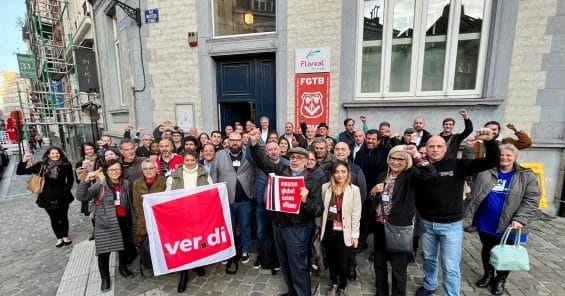As companies increasingly rely on government-subsidized, short-time work schemes to reduce labor costs during the Covid-19 crisis, unions across Europe are working hard to ensure that, in addition to subsidies, companies invest in additional pay for employees to avoid or minimize loss of income.
That’s the case for German union ver.di, which has negotiated multiple collective agreements to increase pay for workers during the pandemic in sectors from retail to finance to healthcare.
“Having strong unions like ver.di step in to ensure that workers do not suffer from a massive loss of income during a crisis of this magnitude is essential in Germany and beyond,” said Christy Hoffman UNI Global Union General Secretary. “As the healthcare crisis leaves a huge economic convulsion, it will be up to the labor movement to ensure that our economies, our employers, and our governments don’t leave anyone behind.”
Because of ver.di, and the rest of the German trade union movement´s advocacy, the government has increase payments, despite resistance from most employers’ associations. The new agreement increases the short-time work compensation to 70 percent (77 percent for households with children) from the fourth month onward and to 80 percent (87 percent) from the seventh month onward to workers who seeing their working hours reduced by at least 50 percent because of the Covid-19 crisis.
ver.di has also embarked on negotiating with employers to supplement state payments to support the many workers who will still struggle to make ends meet. Below is more information about sector specific agreements and the German system:
What exactly is Germany’s ‘short-time work’ scheme?
The plan enables companies which are drastically affected in a downturn to either send workers home or significantly reduce their hours without having to lay them off. If a company takes advantage of the scheme, workers are laid off temporarily but will still be paid. Their employers receive Kurzarbeitergeld or “short-term work money” from the Federal Employment Agency (BA), which is also responsible for paying unemployment benefits. The government will pay 60 percent of the salary workers received before the crisis, or 67 percent if they have children.
Many companies in the retail sector such as Primark, H&M, Zara, Walbusch, Douglas or Fielmann have agreed to increase the short-time working allowance to 90 and 100 percent. In addition, the North Rhine-Westphalia Retailers Association agreed to to increase the short-time working allowance for employees to 100 percent of net remuneration for four-weeks and to 90 percent of net salary for the subsequent period until June 30, 2020.
ver.di and the insurance employers’ association signed a collective bargaining agreement on short-time work limited to one year increasing short-time work compensation to 90 percent or 95 percent of net salary. During the term of the agreement on short-time work, employees are also protected against dismissal for operational reasons.
ver.di and the Association of Public Employers (VKA) agreed on a collective agreement on April 1, 2020, which concerns short-time work in the municipal sector and thus also forsavings banks employees. The agreement regulates and increase in short-time working allowance to 90/95 percent depending on the pay as well as an exclusion of dismissals for operational reasons during short-time work and three months afterwards.
ver.di and the Deutsche Telekom Privatkundenvertrieb GmbH (PVG) have agreed a collective agreement on short-time which excludes dismissals for operational until 31 December 2023. The existing subsidy for short-time work compensation will be increased from the current 80% to 85% of gross pay in relation to gross pay!
Temporary agency work: better pay for employees – bonus for ver.di members
The Covid 19 crisis is also having a major impact on temporary agency workers with many of them losing their contracts or having their hours reduced. In this difficult time, Ver.di has secured a new collective bargaining agreement with salary increases of 1.9 percent in the west and 3 percent in the east in 2020.


